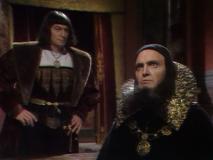I shall miss them. Silly old fusspots
Friday, 26 June 2015 - Reported by Marcus
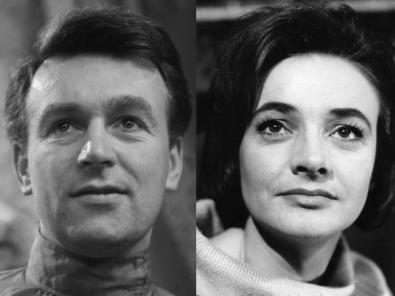
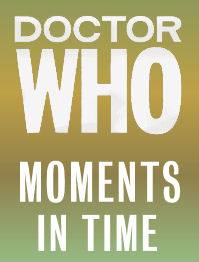 It was on Saturday 26th June 1965, fifty years ago today, that we said goodbye to two of the original Doctor Who companions. It was on that day that both William Russell and Jacqueline Hill left the series, leaving William Hartnell as the only actor left from the original cast of the programme.
It was on Saturday 26th June 1965, fifty years ago today, that we said goodbye to two of the original Doctor Who companions. It was on that day that both William Russell and Jacqueline Hill left the series, leaving William Hartnell as the only actor left from the original cast of the programme.The loss of Ian and Barbara from the series concluded the first major story arc of Doctor Who and forever changed the premise of the show. When it began in 1963, Doctor Who was very much told from the point of view of the two teachers. They were the two investigating the strange child, perplexed by her bewildering knowledge. They were the two who wandered into the junkyard and into adventures beyond their wildest imaginings. They were the two kidnapped from 1960's England, by a strange weird old man, and spirited through space and time.
As the series progressed the relationship between the kidnapper and the kidnapped changed. Circumstances had thrown them together, into danger, into life threatening situations. Over the months, respect, trust and friendship had developed. The two teachers had educated the Doctor, taught him to care and to have responsibility, and in return they had learned to trust the old man. But underneath the narrative was always the premise that Ian and Barbara longed to return home. Back to the world they knew and to friends and family. Instead they had been flung around the universe, visited alien planets such as Skaro, Vortis and Marinus, and times far distant from their own, meeting Aztecs, Romans and Crusaders. There had been hopeful moments, when they thought they might be back, but moments dashed when realisation set in and the couple resigned themselves to more adventures..
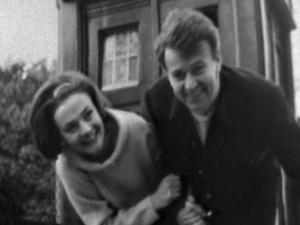 It is ironic that the travellers final return, the solution to their predicament, came not from the Doctor, but from his greatest enemy. It was the Daleks time ship that finally allowed the couple to return home. Returning to London in the 1960's. The Doctor was left with his companion Vicki. No more would the series be the constant endeavour to get the pair home. Doctor Who would now become the Doctor, travelling with his companions in Space and Time.
It is ironic that the travellers final return, the solution to their predicament, came not from the Doctor, but from his greatest enemy. It was the Daleks time ship that finally allowed the couple to return home. Returning to London in the 1960's. The Doctor was left with his companion Vicki. No more would the series be the constant endeavour to get the pair home. Doctor Who would now become the Doctor, travelling with his companions in Space and Time.The loss of Ian and Barbara came about with the decision of William Russell and Jacqueline Hill to leave the series at the end of their second year contract. The series had by now run to 77 episodes, produced on a weekly basis in an almost continuous production run. It was a gruelling schedule that left the actors totally tied to the series. It was William Russell who decided to leave first, telling producer Verity Lambert in Feburary that he wouldn't be continuing for a third year. As a result Terry Nation was asked to write in an new character into the final episode of The Chase. An astronaut who would become the new male companion to the Doctor. Jacqueline Hill was more unsure about leaving, but by May has also taken the decision to go. On May 6th the couple travelled around London with a photographer taking pictures for the montage of their arrival back in London. The couple recorded their final episode on 4th June 1965 in Riverside Studio 1.
The departure of the two actors was deeply felt by William Hartnell. For an actor who like having people around whom he knew and who knew him, the loss of the two stalwarts of the series would be difficult to handle. It came after Carole Ann Ford had departed from the series and amid changes in the production team, with producer Verity Lambert planning to move on. William Russell takes up the story.
I thought Bill would be upset and cross. He was. He couldn't understand. The scene at the end of The Chase where he gets angry, very angry and disappointed. That was very much like what happened... It was difficult to explain to him that I had other things to do.
On her departure from the series Jacqueline Hill took a break from acting to raise a family. She had been married to director Alvin Rakoff since 1958, a year after appearing in his BBC adaptation of Rod Serling's American TV play Requiem For A Heavyweight. Together they had two children, Sasha and John. She returned to acting the 1970's, appearing as Lady Capulet in her husbands production of Romeo & Juliet for the BBC. Other roles included appearances in Angels, Tales of the Unexpected and Paradise Postponed. In 1980 she became to first Doctor Who companion to return to the series playing a different role, when she appeared as Lexa in the 1980 Fourth Doctor story Meglos. In 1993 she died of breast cancer at the tragically young age of 63.William Russell was the best known of the original companions, famous for his roles in series such as The Adventures of Sir Lancelot, long before he joined the TARDIS crew. As a result he quickly won a part in a new spy series Breaking Point following his departure from Doctor Who. Other roles followed including a long run in Harriet's Back in Town for Thames Television, and appearances in Van der Valk, Whodunnit?, Disraeli: Portrait of a Romantic, Shoestring, The Black Adder, Casualty and Heartbeat. In 1992 he played Ted Sullivan in ten episodes of Coronation Street. Russell has reprised the role of Ian Chesterton in various audio adventures. In 2013 he had a cameo in the drama detailing the origins of Doctor Who, playing Harry, the Security Guard, in An Adventure in Space and Time, the drama that saw Jamie Glover play a younger version of himself. In 1988 his second wife, Balbina Gutierrez, gave birth to a son. Alfred Enoch is now an actor, well known for playing Wes Gibbins in the ABC legal drama How to Get Away with Murder. Meanwhile William Russell himself celebrated his ninetieth birthday last year, and still regularly attends Doctor Who conventions.
And what of Ian and Barbara, what happened to them following their departure from the Doctor. The characters have flourished in various novels and fan fiction. In 2013 they met the eleventh Doctor in Hunters of the Burning Stone , a comic story in Doctor Who Magazine written to mark the fiftieth anniversary of the show. In the Television series itself the Chairman of the Governors of Coal Hill School, as shown in The Day of the Doctor, is one I Chesterton.
But the real clue to their future came in Russell T Davies's episode of The Sarah Jane Adventures, The Death of the Doctor. According to Sarah Jane
There is this couple in Cambridge, both professors, Ian and Barbara Chesterton, and the rumour is, they've never aged, not since the sixties.
The actors, and the characters they portrayed, left an indelible mark on the series. The Doctor was left clearly hurt and upset by their departure. At the end of the episode he spoke for us all. I shall miss them. Yes I shall miss them. Silly old fuss pots
. Ian and Barbara leave the Doctor:
Having come into possession of a Dalek time travel machine, Barbara and Ian sense an opportunity to go home, but the Doctor is hesitant to let them go. There are no guarantees that the machine will work, but maybe Vicki can change the Doctor's mind?
 It was ten years ago today, on the 26th March 2005, that Doctor Who was reborn, in a new century, with a new Doctor, for a new generation.
It was ten years ago today, on the 26th March 2005, that Doctor Who was reborn, in a new century, with a new Doctor, for a new generation. 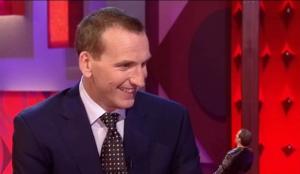
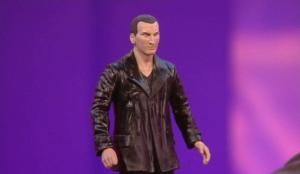
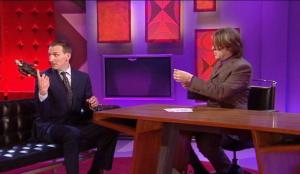
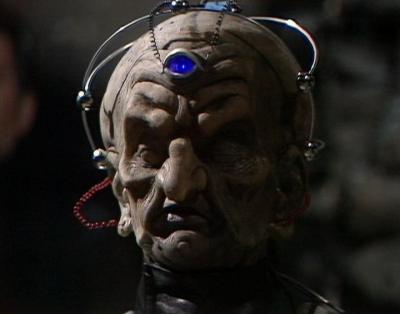
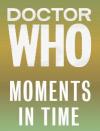 Time Lord: Daleks.
Time Lord: Daleks.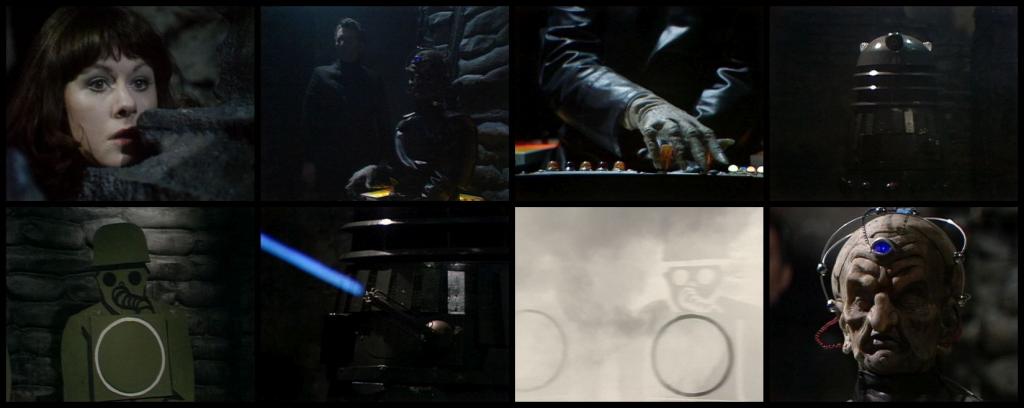
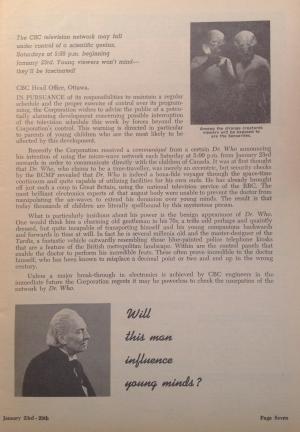

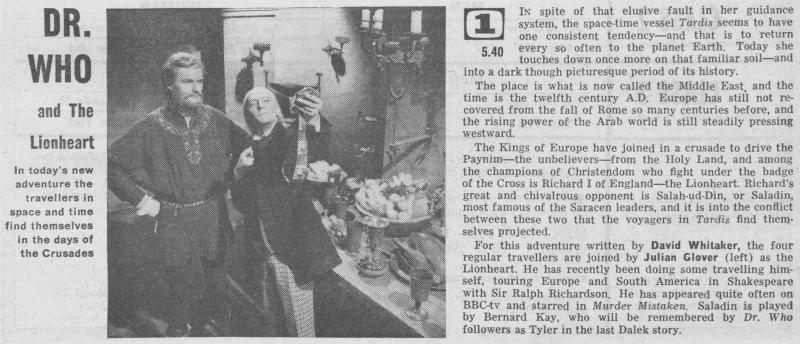

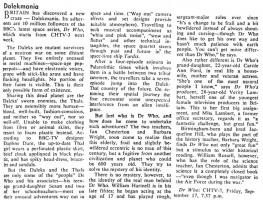

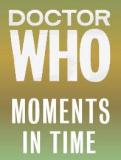 It was fifty years ago today, on Saturday 12 September 1964, that first season of Doctor Who came to a close with the final episode of The Reign of Terror -
It was fifty years ago today, on Saturday 12 September 1964, that first season of Doctor Who came to a close with the final episode of The Reign of Terror - 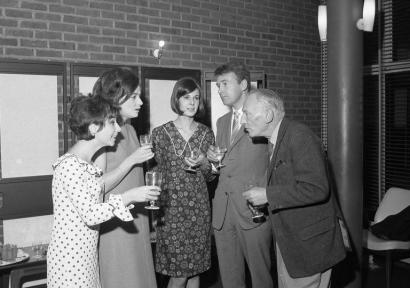 The series has become a ratings success. From a quiet beginning with just 4.4 million viewers watching the debut show, the arrival of the Daleks has brought a surge in interest in the series, reaching a peak of 10.4 million watching in the winter months. As spring turned into summer ratings have declined, but are still very acceptable, with 6.4 million watching the final episode of the season.
The series has become a ratings success. From a quiet beginning with just 4.4 million viewers watching the debut show, the arrival of the Daleks has brought a surge in interest in the series, reaching a peak of 10.4 million watching in the winter months. As spring turned into summer ratings have declined, but are still very acceptable, with 6.4 million watching the final episode of the season. 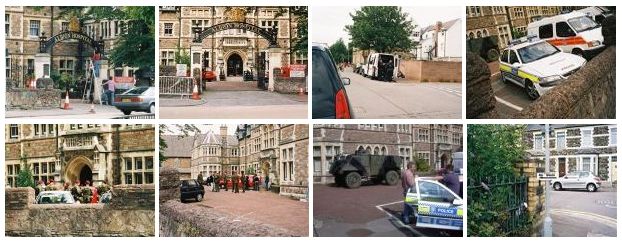
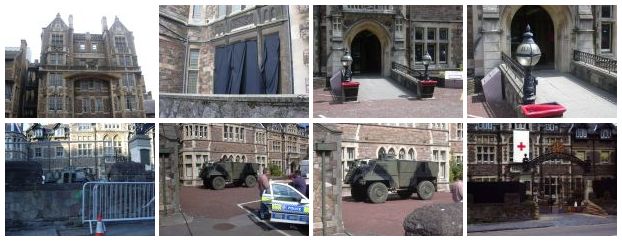

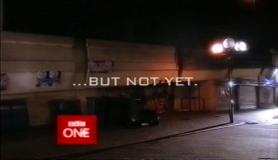 A teaser trailer on New Year's Day 2005 formally introduced the return to the general public, but it wasn't until March when the promotional gears were turned up to maximum with a host of trailers ("Do you want to come with me?") and programmes to build up interest in a way not witnessed again until the 50th Anniversary last year.
A teaser trailer on New Year's Day 2005 formally introduced the return to the general public, but it wasn't until March when the promotional gears were turned up to maximum with a host of trailers ("Do you want to come with me?") and programmes to build up interest in a way not witnessed again until the 50th Anniversary last year. 





